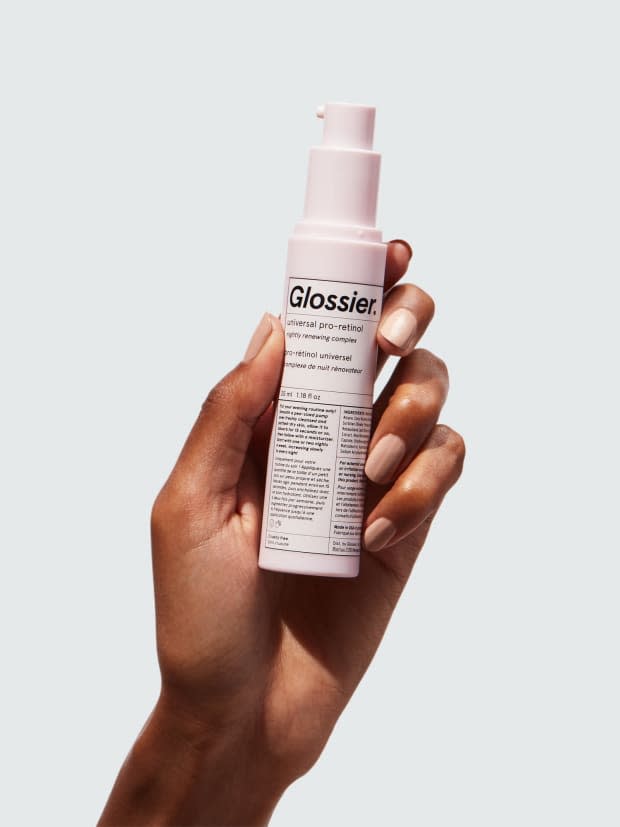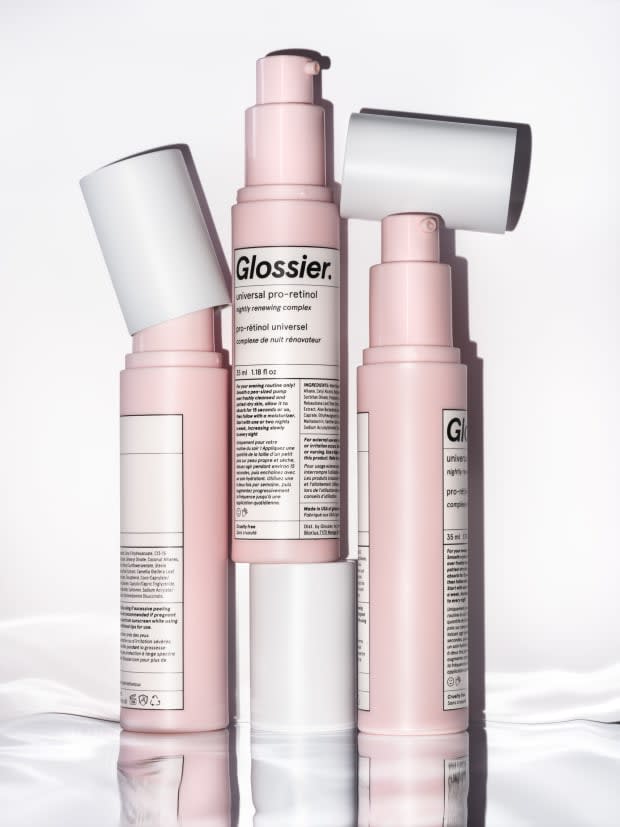Millennials Are Officially Getting Old: Glossier Is Launching a Retinol
The starter retinol features something called "retinyl sunflowerate" derived in part from — yep! — sunflowers.

Photo: Courtesy of Glossier
In news likely to make millennials everywhere contemplate their own mortality and ever-advancing age about as much as those photos that recently surfaced of 2021 Jonathan Taylor Thomas did, Glossier just launched its first retinol. Yes, millennials are hitting their 30s, and — as every meme on my personal Instagram feed seems desperate to remind me — it's officially time to consider an anti-aging night cream.
On Tuesday, Glossier released its latest skin-care product, Universal Pro-Retinol. Described as a "nightly renewing complex," the cream centers on a 0.5% concentration of a whimsically-named Vitamin A derivative hybrid called "retinyl sunflowerate" made from — yep! — sunflowers; more specifically, the ingredient is "a blend of retinol and sunflower fatty acids" which, per the brand, is easily tolerated by all skin types.
Like other retinols, Glossier's formula purports to minimize the appearance of fine lines, blemishes and uneven skin tone and texture, but because the cream is also packed with moisturizing ingredients, it aims to be less harsh, drying or potentially irritating than traditional retinols. The white, buttery cream comes housed in a pump-top bottle (so no digging your fingers into a pot of cream, thankfully) clad in the brand's recognizable millennial pink.

Photo: Courtesy of Glossier
Positioned as a sort of starter retinol, the formula is intended to be an easy entry into the world of vitamin A-derived skin care for those who may have been wary to dip their toes (faces?) into it in the past. Glossier suggests starting out by applying Universal Pro-Retinol one or two nights a week, especially for those who are new to using a retinoid, before gradually working up to nightly applications. It also stresses that this formula is about keeping the long game in mind, as it takes sustained, repeated use to see true results. And, as with any other retinol product, diligent daily use of sunscreen with an SPF of at least 30 is crucial to protecting skin while using the product; alternating days with other actives like exfoliators and vitamin Cs is also highly recommended.
Beyond the retinol ingredient itself, the cream also contains mondo grass root extract and glycerin (humectants that help pull moisture into the skin) and stevia extract (which, per Glossier, can have a wide range of benefits similar to those of retinol itself), and is vegan, cruelty-free and formulated without fragrance. At $35 for a 1.18 fl oz bottle, this is certainly one of the more accessibly-priced retinol products on the market outside of mass brands.
I received a lab sample of Universal Pro-Retinol a few weeks ahead of the launch, so while I didn't have a whole lot of testing time to be able to see any real impact from the retinol (most derms will tell you to stick with a retinol for at least six to eight weeks before expecting any results), I also decided to go all-in with nightly applications, as my skin isn't new to retinoids. I was satisfied to see that even after eight back-to-back applications, my complexion showed absolutely no signs redness, sensitization or dryness, despite that rather rigorous regimen.
For my combination skin — which does occasionally experience sensitization from over-exfoliation and occasional mild rosacea, but is typically not very sensitive — Glossier's claims about being gentle and moisturizing absolutely held up. (I still topped the cream with my usual moisturizer, as per the brand's instructions, but it honestly felt rich enough that I didn't feel I really needed to, at least during these humid summer months.)

Photo: Courtesy of Glossier
Although Glossier expressly warns to avoid applying it on the eye area, I actually found myself dabbing it along my orbital bone, hoping it will help target the spots where I typically Botox away my emerging crow's feet. (My dermatologist has told me it's okay to bring retinol close-ish to my eyes, as long as I'm not noticing any sensitivity and am careful to not actually get it in my eyes.)
The texture is dense but easily spreadable, and it doesn't feel greasy or slick on skin, more so just pleasantly cushiony and soft. The relatively low concentration of the active, paired with moisturizing and coddling ingredients, indeed seem to yield a formula that's likely to be well tolerated by most skin types. And the $35 price point is also sure to boost its appeal — as a beauty editor, I'm thrilled to finally have a non-drugstore retinol I can recommend that's not wildly expensive (although I've always liked options from Neutrogena and RoC, if you do want to go the drugstore route!).
While I'll have to keep using it for a while to report back on any significant results, based on my initial encounters with this product, I'd highly recommend it as an entry-level formula for anyone who has been retinol-curious, but hasn't really committed to a regular routine yet. Sure, those more concerned with finding an AP-level retinol might want to look for something a little more potent from a dermatologist, but the most effective product is always going to be the one you can actually commit to using regularly, so all things considered, I like Glossier's approach.
The good news, my fellow millennials, is that there seems to be a new, actually legit $35 retinol on the market. I urge you to try to cling to that little bit of positivity anytime you're confronted with an article about home ownership rates or the phrase "geriatric millennial" from here on out.
Please note: Occasionally, we use affiliate links on our site. This in no way affects our editorial decision-making.
Never miss the latest fashion industry news. Sign up for the Fashionista daily newsletter.